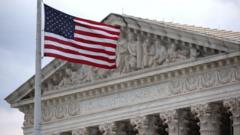The US Supreme Court has effectively blocked public funding for what would have been the nation's first religious charter school, following a tied vote of 4-4, in a case that has drawn significant attention regarding the intersection of religion and education. This decision stems from challenges faced by an approved charter school backed by the Catholic Archdiocese of Oklahoma City and the Diocese of Tulsa, which sought approximately $23.3 million ($18.7 million) in state funds over five years.
The court's split ruling upholds a prior judgment from the Oklahoma State Supreme Court, determining that funding for the religious charter violates the US Constitution. This ruling does not set a nationwide precedent, leaving room for future cases to address similar issues regarding religious funding.
In the case, the justices displayed divisions along ideological lines, although Justice Amy Coney Barrett recused herself without explanation. Following the announcement, which lacked a detailed opinion, legal observers noted that the ruling highlights the ongoing struggle to clarify the boundaries established by the First Amendment, which prohibits government endorsement of any single religion.
Oklahoma Attorney General Gentner Drummond led the charge against the charter school initiative, arguing it would unfairly divert taxpayer resources to support religious education. He celebrated the Supreme Court's ruling as a triumph for religious liberty and upheld the principle that taxpayer money should not finance religious institutions. Acknowledging the fears of broader implications, Drummond emphasized that the ruling protected Oklahoma taxpayers from potential funding of various religious schools, including those that might promote extreme ideologies.
Conversely, advocates for the charter school insisted that the refusal of funding based solely on its religious affiliation constituted a violation of their rights to equal educational opportunities. They expressed disappointment in the court's decision, stating they remain committed to providing parents with educational choices. In response to this ruling, officials of the proposed St. Isidore of Seville Virtual Catholic Charter School indicated they would seek alternative methods of offering religious-based online education to families across Oklahoma.
While the recent ruling may halt this particular charter school, it raises broader discussions about the future role of charter schools in the United States—one that has sparked a growing movement among some conservatives who argue for the expansion of educational options as a means of increasing parental choice in education. With movements involving educational reform continuously evolving, the Supreme Court's decision in this case is likely to shape the trajectory of educational policy in the coming years.
The court's split ruling upholds a prior judgment from the Oklahoma State Supreme Court, determining that funding for the religious charter violates the US Constitution. This ruling does not set a nationwide precedent, leaving room for future cases to address similar issues regarding religious funding.
In the case, the justices displayed divisions along ideological lines, although Justice Amy Coney Barrett recused herself without explanation. Following the announcement, which lacked a detailed opinion, legal observers noted that the ruling highlights the ongoing struggle to clarify the boundaries established by the First Amendment, which prohibits government endorsement of any single religion.
Oklahoma Attorney General Gentner Drummond led the charge against the charter school initiative, arguing it would unfairly divert taxpayer resources to support religious education. He celebrated the Supreme Court's ruling as a triumph for religious liberty and upheld the principle that taxpayer money should not finance religious institutions. Acknowledging the fears of broader implications, Drummond emphasized that the ruling protected Oklahoma taxpayers from potential funding of various religious schools, including those that might promote extreme ideologies.
Conversely, advocates for the charter school insisted that the refusal of funding based solely on its religious affiliation constituted a violation of their rights to equal educational opportunities. They expressed disappointment in the court's decision, stating they remain committed to providing parents with educational choices. In response to this ruling, officials of the proposed St. Isidore of Seville Virtual Catholic Charter School indicated they would seek alternative methods of offering religious-based online education to families across Oklahoma.
While the recent ruling may halt this particular charter school, it raises broader discussions about the future role of charter schools in the United States—one that has sparked a growing movement among some conservatives who argue for the expansion of educational options as a means of increasing parental choice in education. With movements involving educational reform continuously evolving, the Supreme Court's decision in this case is likely to shape the trajectory of educational policy in the coming years.


















